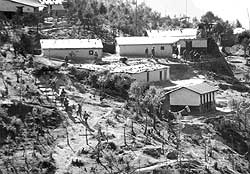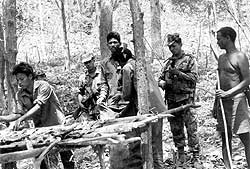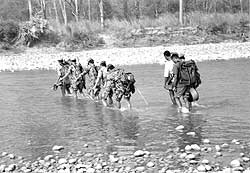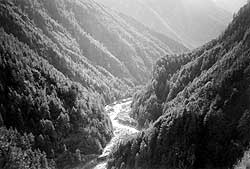 It's been quiet in Phungi Tenga this January. Apart from locals on their way to Namche for business, and the odd tourist stopping in for a cup of tea at one of two lodges en route to Tengboche Monastery, this little wooded enclosure in the heart of the Sagarmatha National Park shuts down early.
It's been quiet in Phungi Tenga this January. Apart from locals on their way to Namche for business, and the odd tourist stopping in for a cup of tea at one of two lodges en route to Tengboche Monastery, this little wooded enclosure in the heart of the Sagarmatha National Park shuts down early. The two lodges close their doors before the evening light fades, and are cautious about entertaining latecomers. Even the small group of soldiers based at the tiny army outpost in Phungi Tenga, located at the base of the hill on which Tengboche Monastery stands, has shifted to the security of Namche, where a company of an estimated 250 soldiers check the foot-traffic coming in from Lukla.
From their perch on a plateau enclosed by barbed wire fencing and surrounded by freshly built dugouts, the soldiers watch over Namche Bazar through pine saplings. They're careful about maintaining strict evening curfew.
Since the emergency began on 26 November, soldiers take turns to patrol the area and are especially careful to watch the Tashi Lapcha Pass to the west and the Amalapcha Pass to the east, possible entry points for Maoists from Dolakha district and Sankhuwasabha, respectively. National security is a priority.
In between, if they can squeeze it in, the soldiers carry out their original duties-working with the two dozen park staff to check the poaching of the musk deer and other endangered species, and the illegal trade of timber and medicinal plants.
 "Even with the army more involved in guarding against Maoists, we're managing to carry out patrols," says Mingma Sherpa, a game scout. "There has been the odd case of poaching, but nothing big."
"Even with the army more involved in guarding against Maoists, we're managing to carry out patrols," says Mingma Sherpa, a game scout. "There has been the odd case of poaching, but nothing big." Since the Maoists attacks on Salleri in Solukhumbu, and in Dang, and the consequent state of emergency, the army has made it a point to pull in their troops from remote outposts in protected areas-especially hilly regions, where the insurgents are most likely to attack by night and steal arms.
It is difficult to reinforce troops on time here, owing to the rugged terrain. "We've cleared the small, isolated army outposts, where 10 to 12 soldiers were based, and merged them with the bigger groups of 40 or 50, so they don't become sitting targets for the Maoists," says an army source. "It is much safer, since our communication sets aren't very good and it's difficult to connect waves in mountainous areas, and then helicopter reinforcements are extremely difficult to fly in."
During the day, the army, accompanied by park staff, conduct mobile sweeps in these abandoned posts. Park authorities have also deployed game scouts and rangers in pairs to monitor the abandoned posts.
"We're trying to maintain double duty, but frankly speaking, there have been lapses in large areas," says the source.
Since the emergency and the withdrawal of soldiers from isolated posts, three dead rhinos were found inside the Royal Chitwan National Park, their hooves and horns missing. "It's definitely a case of poaching," our source in the army told us. "By now local poachers probably have figured out from where we've pulled out and are getting active."
 The army has been guarding Nepal's national parks since 1976, and are partly responsible for the low level of poaching here compared to neighbouring countries. National parks now cover nearly a quarter of Nepal's area and an estimated 5,000 soldiers are stationed in seven national parks and four wildlife reserves around the country.
The army has been guarding Nepal's national parks since 1976, and are partly responsible for the low level of poaching here compared to neighbouring countries. National parks now cover nearly a quarter of Nepal's area and an estimated 5,000 soldiers are stationed in seven national parks and four wildlife reserves around the country. While stressing that other protected areas remain relatively unaffected, department officials acknowledge that there are problems in Chitwan, where poaching activities are on the rise. "Keeping in mind that national security is a priority, we're making use of whatever resources we have," says Tirtha Maskey, director general of the department. "In Chitwan, we've reinforced park staff by adding 15 security officials from the palace's Wildlife Protection Department." The department is intent on mobilising its anti-poaching units and local informers, in Chitwan, Sukhlaphanta, Parsa and Bardiya to work with regular park staff.
Concern for national security may also prevent more than 60,000 villagers from entering Royal Chitwan National Park this winter to collect overgrown elephant grass-an annual event that takes place every January, in the first week of Magh. "We have allowed a regulated number of villagers to cut grass in designated plots in Sukhlaphanta, but haven't yet decided about Bardiya and Chitwan," says Maskey.
While the army, which maintains two companies in the western and eastern part of Bardia, has tried to maintain as many of the original outposts in the park area, at least 30-35 percent of park area is unreachable. Says a Bardiya National Park official: "This is a relatively Maoist-sensitive area. Some areas are under direct vision of the army at all times, but they do maintain high security during the day even in the areas they've pulled out from."
A major problem the army is facing in trying to maintain national security are the large groups of landless settlers maintained by political parties as vote banks in places like Bardia and Sukhlaphanta.
 Says an army official, "While we do conduct body searches on people passing through the area, and also interrogate them, it is extremely difficult to identify Maoists from the crowds of landless settlers who freely pass through the park corridors. They don't dress any differently. It becomes easier for the Maoists to infiltrate the area."
Says an army official, "While we do conduct body searches on people passing through the area, and also interrogate them, it is extremely difficult to identify Maoists from the crowds of landless settlers who freely pass through the park corridors. They don't dress any differently. It becomes easier for the Maoists to infiltrate the area." In the remote Khaptad National Park, located at the junction of Bajura, Bajhang, Doti and Accham districts, all the outposts have been merged, and the company of army soldiers operates from the headquarters based on a plateau inside the park. "In some places, they've burnt and destroyed our outposts, but so far they haven't been able to attack the central points. They underestimated us. They thought we were like the police. But soon realised we're better trained, better equipped for such an attack. At least we have troops, weapons, supplies, and rations to sustain 24 hours of fighting in a remote post," says our army source.
Frequent Maoist activity and the emergency don't mean bad news only for the unprotected animals and ecosystems of the national park. They have also managed to scare off tourists, which means the livelihood of many people dependent on wildlife tourism is in danger. While a few hotels and resorts inside the park are barely functioning, hotels outside the parks find their clientele has simply dried up.


